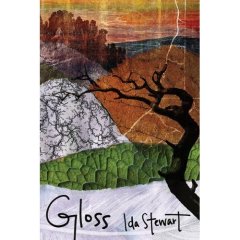Undergraduate Alumni Spotlight: Ida Stewart
by Rebecca Thomas
 “Soil in your mouth sounds like soul—
“Soil in your mouth sounds like soul— like the word’s been oiled, all the old
consolidated, uprooted, from
this spit of overtold land.”
-Ida Stewart, “Soil” from Gloss
Congratulations to undergraduate alumna, Ida Stewart, whose first collection of poems, Gloss, won the 2011 Perugia Press Award (a national poetry award for a first or second book by a woman). With the above excerpt, it’s easy to see why Gloss, Ida’s first collection of poems, was chosen over the other five hundred submissions. It’s also easy to see why Terrance Hayes calls Gloss “a brilliant and endlessly resonant first book.”
With such high praise, it may be surprising to note that Ida didn’t even take a poetry workshop until she was halfway through her undergraduate career here at WVU, but she describes that experience with poetry as “love at first sight.” Graduating in 2004 with degrees in Political Science and English with an emphasis in Creative Writing, Ida calls herself “one of those students who changed her major a few times, and even spent more than a few hours in science labs. But [she] had always been drawn to language—especially the material sounds and textures of words. [She] didn’t realize that preoccupation could become an actual occupation until, in that poetry class, [she] encountered contemporary poets whose writing spoke to and from the world [she] knew, in language that [she] knew. [She] had wrestled with picking a major and a career path because [she] was wary of limits—wanting to major in “everything” and stay connected to many disciplines and parts of the world at once. Indeed, drawing connections between seemingly disparate parts of the world is one of the beautiful things that poems do.”
Gloss seems to be doing just that. Drawing on the Appalachian region, Gloss is a collection that explores the landscape and politics of Appalachia. Ida says that “many of the poems respond to mountaintop removal coal mining—in some of the poems the “mountaintop” actually speaks in a humanized, female voice—considering what it means to live simultaneously amid both great beauty and great turmoil, tradition and upheaval, simplicity and complexity. Other poems in the book are set in more emotional landscapes—driving on the hairpin turns within the mind and heart.”
This blending of landscapes seems to be exactly what drew Perugia to Ida’s work. In a press release about the award, the publisher describes the language of Gloss as “in flux, full of paradox and thresholds, each word and line a peak or a range. The poems are mined from the ruptured and fragmented rock and dirt of the colloquial, creating a kind of “landguage” or “langscape.” Indeed, the poems (mis)behave like little ecosystems, in which word-play, rhyme, and enjambment simultaneously make and break sense, join and repel—evoking the tensions between progress and resistance.”
Ida, a current PhD candidate in Creative Writing at University of Georgia, seems to be drawn to this dichotomy in her work. She says that “the joy and challenge of writing is its endlessness. This is a wonderful thing when you’ve found subject matter—like my mountains—that you find endlessly fascinating. But it can be frustrating for beginning writers who want to know whether their work is correct or good. Writing requires patience and an open heart. Recklessness is where it’s at… Ditch your eraser and fill up your notebook as fast as you can…”
Ida will be reading with MFA alumni and WVU faculty member, Katie Fallon, on Wednesday, January 18 at 7:30 p.m. in 130 Colson Hall.
If you are interested in Gloss, click here to visit Amazon.

 Feed
Feed
Comments disabled
Comments have been disabled for this article.